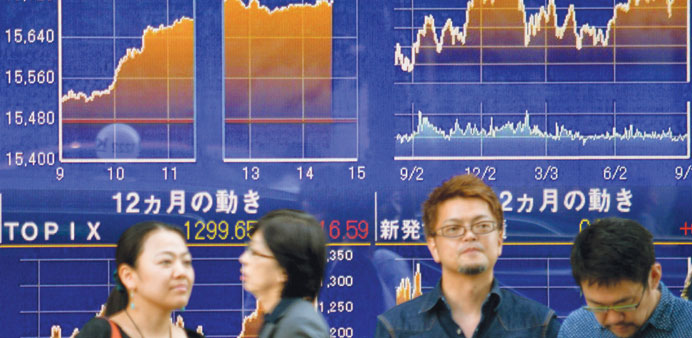A window of a securities firm displays the day’s movement of Japanese stock index in Tokyo. The Nikkei closed at its highest level in over seven months yesterday.
AFP/Tokyo
Asian markets mostly rose yesterday, with Tokyo gaining more than 1% as the yen sank against the dollar, while Shanghai was boosted by hopes China will introduce economy-boosting measures.
With Wall Street closed for the Labor Day weekend investors were given an anaemic lead from Europe, where traders were eyeing the standoff between Russia and the West over Ukraine.
Tokyo rallied 1.24%, or 192points, to 15,668.60 and Sydney rose 0.51%, or 28.67 points, to close at a six-year high of 5,658.5.
Shanghai jumped 1.37% or 30.54 points to 2,266.05. Hong Kong finished almost unchanged, edging down 3.07 points to 24,749.02.
However, Seoul closed 0.79% lower, giving up 16.28 points to 2,051.58.
In other markets, Bangkok added 0.21%, or 3.25 points, to closed at 1,568.60; Bangkok Bank gained 0.95%, or 2baht, to 212.00, while Airport of Thailand lost 0.84%, or 2baht, to 237.00.
Singapore rose 0.43%, or 14.17 points, to 3,328.30; Singapore Telecommunications rose 1.81% to Sg$3.94 while DBS Bank eased 0.11% to Sg$17.93.
Jakarta ended up 0.46%, or 23.97 points, at 5,201.59; Bank Negara Indonesia rose 2.79% to 5,525 rupiah, while Hero Supermarket fell 0.59% to 2,525 rupiah.
Kuala Lumpur’s main index gained 1.58 points, or 0.01%, to 1,867.69; Malayan Banking added 0.40% to 10.14 ringgit, Telekom Malaysia rose 0.31% to 6.38 while Public Bank lost 0.52% to 19.18 ringgit.
Taipei shed 1.19%, or 113.34 points, to end at 9,399.72; Taiwan Semiconductor Manufacturing Co fell 1.95% to Tw$126.0 while Hon Hai Precision was 0.99% lower at Tw$100.5.
Wellington rose 0.12%, or 6.37 points, to 5,221.77; Fletcher Building was up 0.66% at NZ$9.18 and Air New Zealand was flat on NZ$2.17.
Manila closed 0.33% higher, adding 23.07 points to 7,106.56; International Container Terminal Services rose 0.09% to 114.10 pesos, SM Investments grew 0.76% to 795.50 pesos and Aboitiz Equity Ventures added 1.64% to 55.90 pesos.
The Nikkei was the stand-out major performer yesterday as the dollar edged towards the 105 yen level not seen since the start of the year, with analysts suggesting dealers are betting on the Bank of Japan to loosen monetary policy.
A weaker yen boosts Japanese exporters. Osamu Takashima, chief FX strategist at Citigroup Global Markets Japan, said in a note that recent weakness in the yen suggests dealers “have quietly started factoring in the BoJ’s additional monetary easing”.
The bank holds a two-day policy meeting this week following a string of weak data, with its policymakers facing calls to unveil new economy-boosting measures which would tend to weigh on the yen.
Against that the US Federal Reserve is being urged in some quarters to raise interest rates—which lift the dollar—as the world’s number one economy gets back on track.
In Asian trade, the dollar was at ¥ 104.82, against ¥104.27 in European trade.
The yen also eased to 137.65 to the euro from 136.94 in Europe.
However, the euro dipped to $1.3129 from $1.3133, with expectations increasing that the European Central Bank will announce policies at a meeting this week to fight off deflation in the troubled bloc.
Pressure increased Monday on the bank to move after an index of eurozone manufacturing showed activity slipped in August. Markit’s purchasing managers’ index (PMI) fell to 50.7, from 51.8 in July. While anything above 50 shows growth the sharp drop has fuelled fears for the region.
Dealers are watching events in eastern Europe after NATO accused Russia of sending in around 1,000 troops to support anti-government rebels in Ukraine’s east.
That came a day after Russian President Vladimir Putin called for the first time for statehood to be discussed for the restive region.
The events have raised fears of a conflict in Europe and led the West to warn of fresh sanctions against Moscow, while German President Joachim Gauck said Putin has “effectively severed its partnership” with Europe and wants to establish a new order.
In China dealers are betting on Beijing introducing more accommodative measures after the release Monday of its official PMI and a separate one by HSBC showing a slowdown in manufacturing growth.
While leaders have refused to launch anything on the scale of the stimulus seen in 2008, traders are hoping a batch of small measures seen earlier this year could be added to.
On oil markets US benchmark West Texas Intermediate for October delivery eased 30 cents to $95.66. Brent crude for October was down 26 cents to $102.53 in afternoon trade.
Gold traded at $1,271.33 an ounce from $1,286.98 late Monday.

